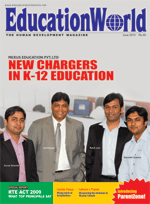 Congratulations to the young team at Mexus for developing innovative ICT-enabled education products and processes (‘New chargers in K-12 education’, EW June). It’s very encouraging to read that this start-up company has invested so heavily in R&D and product conceptualisation, and development.
Congratulations to the young team at Mexus for developing innovative ICT-enabled education products and processes (‘New chargers in K-12 education’, EW June). It’s very encouraging to read that this start-up company has invested so heavily in R&D and product conceptualisation, and development.
Indian education has its own peculiar problems and only companies which understand and address them with indigenously researched and developed solutions will succeed. Solutions imported from the West cannot work in Indian classroom environments.
Sunil Khanna
Mumbai
Unwarranted apprehension
The views of some of India’s top school principals on the controversial provisions of the Right to Education Act, 2009 were interesting to read (EW June). While most of them welcome the provision of free and compulsory educ-ation to children, they seem unhappy about s.12 which mandates 25 percent reservation for under-privileged children in class I of private schools. Almost all principals interviewed advanced the argument that it would be very difficult for children admitted under the quota to adjust academically, culturally and emotionally in elite schools.
It’s actually middle and upper middle class children who fill up private schools who will have problems adjusting to new egalitarian class-rooms. Most of them are ill-mannered, self-centred and have an over-blown sense of entitlement. They are completely oblivious to the sentiments and suffering of the other 99 percent who eke out miserable lives outside their 5-star schools.
Apart from social justice and equity, in the interests of student body diversity and developing socially responsible and aware citizens, the 25 percent reservation proposal must be strongly supported by all, particularly principals who lead India’s most respected private schools.
Sunaina Chatterjee
Delhi
Wasted advantage
This is in reference to your guest column ‘Learning English the enjoyable way’ by Eoin Geraghty (EW June). As rightly said, although English is the lingua franca the world over, it has not yet been embraced whole-heartedly in a few countries including India.
This is because teaching English in the school system has been reduced to merely teaching simple conversational English. Even at the collegiate level, rigorous standards of writing and communication are not demanded, even in English medium instituitions. In the rapidly globalising world where English is the primary language of trade and commerce, there is an urgent need for school and college managements to insist upon higher standards in the teaching and learning of English in education institutions.
Malini Rangarajan
Bangalore
Questionable survey
I was disappointed to read your survey of India’s most preferred pre-schools (EW May). In particular, I am astonished that Head Start Montessori House of Children, Koramangala, Bangalore, was ranked last under the parameter of ‘special needs education’. I would like to set out a few facts that seem to have been overlooked by the author of the cover story, and to correct misinformed perceptions about our institution.
Head Start was the pioneer in the field of ‘inclusive education’ in Bangalore. Since the school started in 1995, our programme’s philosophy has always been “no child left behind”. Every child is given equal opportunity to learn and gain from the natural classroom environment irrespective of her special needs.
I am aware of this because I have been associated with the inclusive programme at Head Start for the past five years as a Montessori trained special educator.
First and foremost, Head Start believes in ‘inclusive education’ and not ‘special education’ which is a unique feature of our education system. For the past 15 years we have been providing challenged children with facilities for music, theatre, carpentry, and tailor-made sports programmes. Their academic progress is monitored with individual education plans.
We believe this survey has not been conducted in the right spirit. This letter is to understand from you the basis of the ratings and ranking and the criteria used to measure and compare schools. If you don’t explain, the credibility of your magazine may be seen as questionable.
Nithya Girish
Head Start School, Bangalore
As explained in the introduction of our cover story, the ratings and ranking of pre-schools are based on the perceptions of 1,232 SECA parents and 290 principals/teachers countrywide (including 208 and 55 respectively in Bangalore) representing public opinion, not facts (see p.40) — Editor
Pre-school survey appreciation
Your cover story and first ever ranking of India’s best pre-schools (EW May) is very informative, precise and an absolute must-read for all young parents. All the parameters according to which pre-schools in six cities were ranked were well-chosen.
I am happy you selected these parameters as it’s about time that standards are set for early childhood education. With pre-schools mushroom-ing, without proper guidelines and adequate infrastructure, your choice of parameters and ranking methodology will enable parents to choose the right pre-school for their children.
Thank you for enlightening thousands of parents, recognising so many pre-schools and encouraging us to strive harder.
Sujata Vijay
Bamboola, Chennai